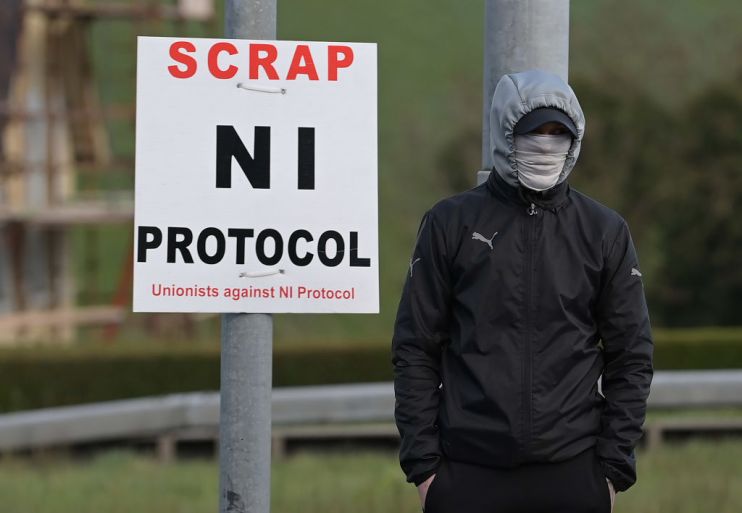Downing Street says post-Brexit Northern Ireland Protocol in current form should be scrapped

Downing Street has said the post-Brexit Northern Ireland Protocol cannot continue in its current form and that it should be “urgently” changed.
Boris Johnson’s spokesman told journalists today that Northern Irish businesses “have made extraordinary efforts to adjust” to the Brexit treaty’s terms, but that “it’s hard to see the way the protocol is operating can be sustainable for long”.
Johnson’s UK-EU relations minister Lord David Frost also told MPs today that EU political leaders’ poor understanding of Northern Ireland was contributing to post-Brexit issues and that the “unsettledness” in Belfast has been more than previously expected.
It comes after a source close to Johnson said to the Sunday Telegraph yesterday that the Northern Ireland Protocol was “dead in the water”.
The protocol has been met with fury by some parts of the unionist community for creating a so-called border in the Irish sea, which sees Northern Ireland treated differently to the rest of the UK.
Northern Ireland still follows the EU’s customs union and single market rules, while the rest of the UK does not.
Full customs checks were supposed to be imposed on things like food, parcels and medicines going from Great Britain to Northern Ireland from June, however the UK moved earlier this year to unilaterally postpone these checks until October.
Frost is locked in discussions with European Commission vice president Maros Sefcovic on how to apply the protocol, after Brussels launched legal action against the UK over its move to postpone border checks.
“Our focus is on addressing the significant challenges the protocol is putting on businesses and citizens,” Johnson’s spokesman said.
“Businesses have made extraordinary efforts to adjust, it’s hard to see the way the protocol is operating can be sustainable for long.
“We don’t have a serious deadline, but we want solutions to be found rapidly and both sides must move urgently.
“It’s clear the protocol is presenting serious challenges for many businesses and we want serious solutions to solve them.”
The protocol, combined with Brussels’ quickly overturned move in January to break the Brexit Withdrawal Agreement, has sparked growing anger in some of Northern Ireland’s unionist communities.
This is one of the reasons behind almost two weeks of violent rioting seen in Belfast last month, while Northern Ireland first minister Arlene Foster was forced to quit over anger from within her Democratic Unionist Party (DUP) about the post-Brexit arrangements.
The BBC is reporting that British negotiators have presented a four-point plan to Brussels officials for the implementation of checks at the border for goods going across the Irish Sea.
The plan has checks on some UK food products beginning in October, before a more extensive system is phased in over the six months afterward.
Brussels was initially infuriated by the UK’s move to push back the imposition of border checks as it is concerned about goods entering its single market without adhering to the official guidelines.
Frost wrote in the Mail on Sunday yesterday that the protocol risked political stability in Northern Ireland.
Speaking at Westminster’s European scrutiny committee, Frost said the EU needed to be more flexible with how the Northern Ireland Protocol is implemented.
“We have the ability to move things forward, Maros [Sefcovic] has to operate in a mandate that is set by the wider [European] Commission and other member states not all of which understand Northern Ireland as well as he now does,” he said.
“I think that is one of the reasons why we are finding difficulty in moving this forward.
“There’s a provision in the Withdrawal Agreement…which puts us both under obligation to minimise as far as possible barriers to Great Britain and Northern Ireland trade. I’m not sure that obligation has been fully fulfilled.”
Irish foreign minister Simon Coveney said last week that there was “pressure” to come up with solutions by Northern Ireland’s unionist marching season in June.
“The last thing we want to see is…moving into a marching season this summer, without Covid-19 restrictions keeping people in their homes, without many of these issues resolved politically,” he said.